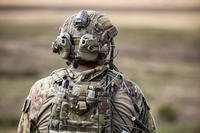It's little wonder Audie Murphy wound up in Hollywood. His Medal of Honor citation reads like a clip from a fast-paced action movie. The scene: Holtzwihr, France, Jan. 26, 1945. The actors: 2nd Lt. Audie Murphy, the men of Company B, and a host of hostile Germans.
The action: After ordering his men to withdraw, Murphy took his command post and prepared to give fire directions by telephone. One of the company's tank destroyers took a direct hit, and Murphy climbed onto the burning vehicle, using its machine gun to kill dozens of the enemy. Although the destroyer could have exploded at any minute, Murphy held his position for an hour, mowing down Germans attacking from three sides. When his ammunition was exhausted, Murphy made his way to his company. Refusing medical attention for a leg wound, he organized his men in a counterattack that forced the remaining enemy troops to withdraw.
Audie Murphy's real-life "indomitable courage" made his performance in the movie "To Hell and Back" so compelling that it held box-office records for two decades. He honed his courage and shooting skills growing up as the eldest son of poor Texas sharecroppers, using the first to survive and the latter to put food on the table. Murphy joined the Army because it offered advancement opportunities. He took advantage of these, rising quickly from private to staff sergeant and then receiving a battlefield commission as a second lieutenant.
Murphy's Medal of Honor shared space with 33 other awards and decorations, making him the most decorated U.S. combat soldier of World War II. He received every decoration for valor the United States had to offer — some more than once — and received five decorations from the governments of France and Belgium. The U.S. Army once declared that "there will never be another Audie Murphy."
Related links:















